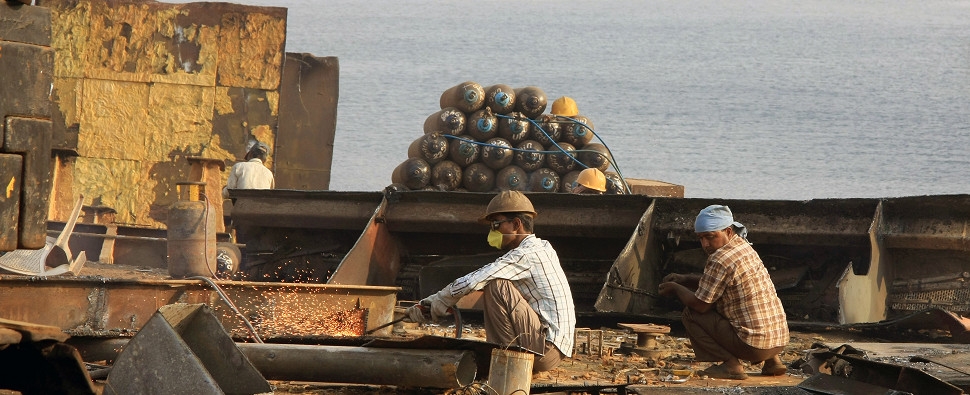NGOs Applaud Carrier But
Regret Ship Beached In India
 |
SHIPBREAKERS AT WORK IN DARUKHANA YARD IN MUMBAI,
INDIA: The U.S. Carrier Matson Has Committed To No Longer Send Ships To That
Region Of The World For Recycling. (Image: JHMimaging / Shutterstock.Com)
|
The non-governmental organization Shipbreaking Platform applauded the
U.S. shipping company Matson, Inc. for committing to recycle its old ships only
in responsible yards in the future.
This decision is significant, says, the NGO, as 23 vessels in the Matson
fleet have to be dismantled in the coming years.
The Matson decision came after the Basel Action Network (BAN), U.S.-based
member of Shipbreaking Platform, revealed the sale of the Matson-owned Horizon
Trader for substandard scrapping in India.
Shipbreaking Platform and BAN called on All Star Metals of Brownsville,
Texas, the last holder of Horizon Trader, to return the ship and ensure the
clean and safe recycling of the vessel.
The Horizon Trader, a 42 year-old U.S. flagged container ship was
acquired by Matson when the carrier purchased Horizon Lines late last year. A
decision was made to scrap the vessel and it was delivered to the All Star
Metals ship recycling facility in Brownsville, Texas, in January 2015. The
original Horizon Lines memorandum of agreement for the sale of the Horizon
Trader, obtained by BAN, stipulated that the buyer would responsibly recycle
the vessel in the U.S.
According to the NGOs, shipbreaking yards in India operate under
dangerous and polluting conditions. Workers labor on tidal sands to dismantle
the vessels, breathe in toxic fumes and asbestos, and fall victim to accidents.
They live in shacks close to the yards often without basic sanitary facilities
or supply with drinking water. Asbestos removed from the vessels is traded in
local marketplaces.
“The conditions in the shipbreaking yards are not line with international
standards for environmentally sound management, occupational health and safety
rules, and fundamental labor rights,” said Patrizia Heidegger, director of
Shipbreaking Platform. “If Indian shipbreakers want to be part of a global industry
providing services to international shipping companies that are more and more
conscious of environmental and social issues, they have to live up to these
standards.”
The HORIZON TRADER was photographed on September 2nd being towed out of
the Port of Brownsville with fresh paint on the ship’s hull masking the
identity of the vessel. BAN notified Matson and asked the company to recall the
ship, and the carrier claimed it no longer had the authority to do so.
Matson later released the following statement: “Because of concerns with
recycling practices in South Asia, Matson has decided to expressly prohibit
recycling of its vessels in this region going forward.”
“While the export of the Horizon Trader may be legal according to U.S.
law, it outsources pollution and U.S. jobs to Asia and is highly
irresponsible,” said Colby Self, green ship recycling campaigner at the Basel
Action Network.
A growing number of shipowners—including the 160 members of the Norwegian
Shipowners’ Association and the carriers Hapag-Lloyd, Maersk Lines, Royal Dutch
Boskalis, CSL Group, and China Navigation Company—prohibit ships to be scrapped
on South Asian beaches.
“Matson’s off-the-beach commitment reflects a level of corporate
leadership which we hope will be echoed by other U.S. shipping companies,” said
Self.
Self noted that the U.S. government has maintained a
long-standing policy requiring its own ships to be recycled domestically and
off beaches. But U.S. law allows private shipowners to reflag their vessels for
disposal on foreign shipbreaking beaches.
Source: global trade
mag. 01 October 2015
No comments:
Post a Comment